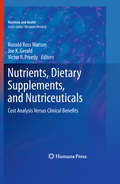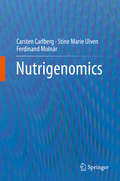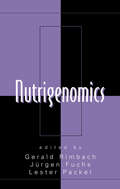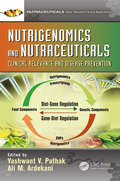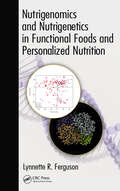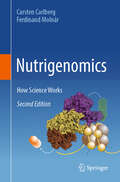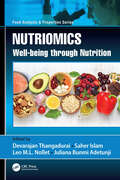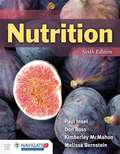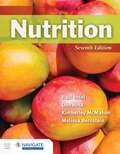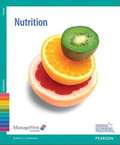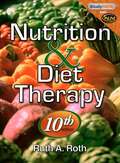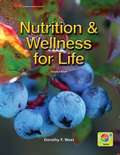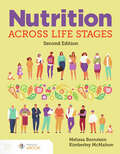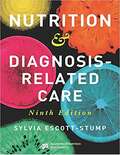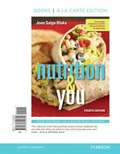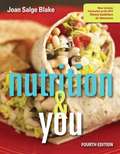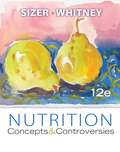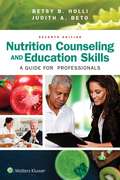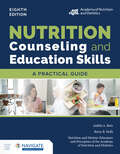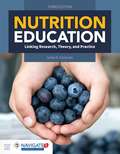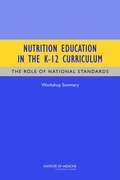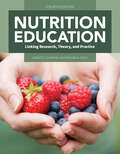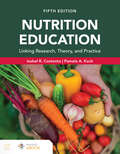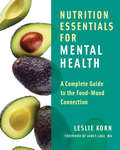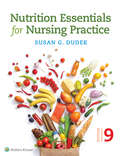- Table View
- List View
Nutrients, Dietary Supplements, and Nutriceuticals
by Victor R. Preedy Ronald Ross Watson Joe K GeraldNutrients, Dietary Supplements, and Nutriceuticals: Cost Analysis Versus Clinical Benefits provides the most current, concise, scientific appraisal and economic analysis (costs vs. benefit) of nutritional supplements and bioactive components (nutriceuticals) of foods in improving the quality of life. It fills a much-needed gap to have a single volume provide a synopsis of cost analysis of dietary supplements and nutritional products as well as therapies for treatment and prevention of disease. Chapters include emerging fields of science and important discoveries relating to early stages of new nutriceuticals in cancer prevention, prior to clinical trials. Written by international and national standing leaders in the field, Nutrients, Dietary Supplements, and Nutriceuticals: Cost Analysis Versus Clinical Benefits is essential reading for nutritionists, pharmacologists, health care professionals, research scientists, cancer workers, pathologists, molecular and cellular biochemists, physicians, general practitioners as well as those interested in diet and nutrition in disease resistance via immune regulation.
Nutrigenomics
by Carsten Carlberg Ferdinand Molnár Stine Marie UlvenThe fascinating area of Nutrigenomics describes this daily communication between diet, food and nutrients, their metabolites and our genome. This book describes how nutrition shapes human evolution and demonstrates its consequences for our susceptibility to diseases, such as diabetes and atherosclerosis. Inappropriate diet can yield stress for our cells, tissues and organs and then it is often associated with low-grade chronic inflammation. Overnutrition paired with physical inactivity leads to overweight and obesity and results in increased burden for a body that originally was adapted for a life in the savannas of East Africa. Therefore, this textbook does not discuss a theoretical topic in science, but it talks about real life, and our life-long "chat" with diet. We are all food consumers, thus each of us is concerned by the topic of this book and should be aware of its mechanisms. The purpose of this book is to provide an overview on the principles of nutrigenomics and their relation to health or disease. We are not aiming to compete with more comprehensive textbooks on molecular nutrition, evolutionary biology, genomics, gene regulation or metabolic diseases, but rather will focus on the essentials and will combine, in a compact form, elements from different disciplines. In order to facilitate the latter, we favor a high figure-to-text ratio following the rule "a picture tells more than thousand words". The content of this book is based on the lecture course "Nutrigenomics", which is held since 2003 once per year by Prof. Carlberg at the University of Eastern Finland in Kuopio. The book is subdivided into three sections and twelve chapters. Following the "Introduction" there are sections on the "Molecular genetic basis" and the "Links to disease", which take a view on nutrigenomics from the perspective of molecular mechanisms or from the causes of metabolic diseases, respectively. Besides its value as a textbook, Nutrigenomics will be a usefull reference for individuals working in biomedicine.
Nutrigenomics (Oxidative Stress and Disease)
by Martin GardnerNutritional genomics, also referred to as nutrigenomics, is considered one of the next frontiers in the post-genomic era. This book features the latest research on the role of oxidants and dietary antioxidants in the modulation of gene expression, aging, immune function, neuroprotection, and vascular heath. It covers the relationship between oxidants, antioxidants, and gene expression, as well as new molecular techniques for the study of redox-regulated signal transduction. It summarizes the molecular mechanisms of phytochemicals and trace elements, emphasizes the impact of variations in the human genotype on individual responses to nutrients, and offers a summary of the effect of lipid and water soluble antioxidants and fatty acids on gene expression in cultured cells, laboratory animals, and humans.
Nutrigenomics and Nutraceuticals: Clinical Relevance and Disease Prevention (Nutraceuticals)
by Yashwant V. Pathak Ali M. ArdekaniGenomics and related areas of research have contributed greatly to the understanding of the cellular and molecular mechanisms underlying diet–disease relationships. In the past decade, the evidence has become stronger for a direct link between genome/epigenome damage and increased risk for adverse health outcomes. It is now exceedingly clear that micronutrients are critical as cofactors for many cellular functions, including DNA repair enzymes, methylation of CpG sequences, DNA oxidation, and/or uracil incorporation into DNA. Nutrigenomics and Nutraceuticals: Clinical Relevance and Disease Prevention brings new perspectives on disease prevention strategy based on the genomic knowledge and nutraceuticals of an individual and the diet he or she receives. This book discusses the integration and application of genetic and genomics technology into nutrition research and paves the way for the development of nutrition research programs that are aimed at the prevention and control of chronic disease through genomics-based nutritional interventions. In this book, the editors bring together a wide spectrum of nutritional scientists worldwide to contribute to the growing knowledge in the field of nutrigenomics and nutraceuticals.
Nutrigenomics and Nutrigenetics in Functional Foods and Personalized Nutrition
by Lynnette R. FergusonWhile functional foods have become a reasonably well-established concept, personalized nutrition is still treated with skepticism by many. The recognition that people would have different nutrient requirements, or perceive foods in different ways, raises several concerns-some real, some not so real. Nutrigenomics and Nutrigenetics in Functional Foo
Nutrigenomics: How Science Works
by Carsten Carlberg Ferdinand MolnárNow in its second edition, this concise textbook provides an overview of the field of nutrigenomics, a topic at the intersection of nutrition and genetics that explores how dietary molecules interact with our genome and epigenome to influence health and disease. Substantially updated and expanded, the book offers a fresh perspective on how diet has shaped human evolution and our susceptibility to conditions such as type 2 diabetes and cardiovascular disease. The 11 chapters cover a wide range of topics, beginning with an overview of the role of nutrients in health and disease, basic mechanisms of nutrient sensing and nuclear receptors, and the impact of epigenetic regulation on health. Readers will discover how chromatin-modifying enzymes and energy status-sensing kinases play critical roles in signaling pathways between diet and the genome. The book also explores the influence of diet on cancer prevention, the importance of the microbiome, and low-grade chronic inflammation and aging. Written in an accessible style, this textbook is intended for undergraduate and graduate students in nutrition, biochemistry, molecular biology, and biology as well as for students and practitioners in medicine. Numerous color illustrations aid in the transfer of knowledge by graphically summarizing complex processes. Combined with a glossary that explains key terms, this work is an indispensable resource for anyone interested in how our daily dietary choices interact with our genome.
Nutriomics: Well-being through Nutrition (ISSN)
by Leo M.L. Nollet Devarajan Thangadurai Saher Islam Juliana Bunmi AdetunjiImplementation of robust omics technologies enables integrative and holistic interrogation related to nutrition by labeling biomarkers to empirically assess the dietary intake. Nutriomics: Well-being through Nutrition aims to enhance scientific evidence based on omics technologies and effectiveness of nutrition guidelines to promote well-being. It provides deep understanding towards nutrients and genotype effects on disease and health status. It also unveils the nutrient–health relation at the population and individual scale. This book helps to design the precise nutritional recommendations for prevention or treatment of nutrition-related syndromes.Nutriomics: Well-being through Nutrition focuses on: The impact of molecular approaches to revolutionize nutrition research for human well-being Various biomarkers for bioactive ingredient analysis in nutritional intervention research Potential of transcriptomic, genomic, proteomic, metabolomic, and epigenomic tools for nutrition care practices Recent updates on applications of omics technologies towards personalized nutrition Providing comprehensive reviews about omics technologies in nutritional science, Nutriomics: Well-being through Nutrition serves as an advanced source of reference for food developers, nutritionists, and dietary researchers to investigate and evaluate nutriomics tools for development of customized nutrition and food safety. It is also a useful source for clinicians and food industry officials who require intense knowledge about emerging dietary-related tools to revolutionize the nutrition industry.This is a volume in the Food Analysis and Properties series, a series designed to provide state-of-art coverage on topics to the understanding of physical, chemical, and functional properties of foods.
Nutrition
by Paul Insel Don Ross Melissa Bernstein Kimberley McMahonThe Sixth Edition of Nutrition provides a modern, comprehensive introduction to nutrition concepts, guidelines, and functions. Its student-focused approach provides readers with the knowledge they need to make informed decisions about their overall nutrition.
Nutrition
by Paul Insel Don Ross Melissa Bernstein Kimberley McMahonWritten for major and advanced non-major course offerings, Nutrition, Seventh Edition provides students with a comprehensive, current, and science-based introduction to nutrition concepts, guidelines, and functions. It's student-focused approach provides information about topics and issues that concern them -- a balanced diet, nutritional supplements, weight management, exercise, and much more. Throughout each chapter readers will engage with the latest dietary guidelines, scientific evidence, and national standards to help individuals follow a healthy dietary pattern at every life stage.
Nutrition
by National Restaurant Association StaffThis text focuses on NUTRITION topics. It includes essential content plus learning activities, case studies, professional profiles, research topics and more that support course objectives. The text and exam are part of the ManageFirst Program® from the National Restaurant Association (NRA). This edition is created to teach restaurant and hospitality students the core competencies of the Ten Pillars of Restaurant Management. The Ten Pillars of Restaurant Management is a job task analysis created with the input and validation of the industry that clearly indicates what a restaurant management professional must know in order to effectively and efficiently run a safe and profitable operation. The ManageFirst Program training program is based on a set of competencies defined by the restaurant, hospitality and foodservice industry as those needed for success. This competency-based program features 10 topics each with a textbook, online exam prep for students, instructor resources, a certification exam, certificate, and credential. The online exam prep for students is available with each textbook and includes helpful learning modules on test-taking strategies, practice tests for every chapter, a comprehensive cumulative practice test, and more! This textbook includes an exam answer sheet to be used with the paper-and-pencil version of the ManageFirst certification exam.
Nutrition & Diet Therapy
by Ruth A. RothNUTRITION & DIET THERAPY, 10TH EDITION is the ideal introduction to the essentials of nutrition concepts, good health and client care. This book will help nurses to more effectively help their clients improve their nutrition and overall health.
Nutrition & Wellness for Life
by Dorothy WestExplores strategies for staying physically active through the life span,considerations when selecting various nutrition and wellness products and services and the special needs of the competitive athlete.
Nutrition Across Life Stages
by Melissa Bernstein Kimberley McMahonGood nutrition is a critical component at every stage of life. Nutrition Across Life Stages, Second Edition covers topics applicable and relevant for entry-level Nutrition and Dietetics students who are focusing their study on nutritional requirements and challenges during each life stage. The text clearly and comprehensively presents the impact of nutrition on people across the life cycle, moving through each life stage by first highlighting normal nutritional needs before delving into the implications of nutrition for health and disease at each particular stage of life. Each new print copy includes 365-day Navigate eBook access. Instructor resources include test bank, slides in PowerPoint format, image bank, and instructor's manual with learning objectives, chapter outlines, answers to in-text questions, and more.
Nutrition And Diagnosis-related Care
by Sylvia Escott-StumpThis authoritative go-to resource for students and clinical nutrition practitioners covers over 270 conditions in 16 sections. Each section provides an overview followed by essential evidence-based information on nutrition management of each condition. Nutrition therapy and practical guidance is presented in a unique style that is easy-to-navigate and implement in practice. Mini case studies throughout demonstrate application of the Nutrition Care Process and standardized language in a practical example.
Nutrition And You
by Joan Salge BlakeThe Fourth Edition of Nutrition & You provides students with a personalized approach to understanding nutrition and teaches them to become informed consumers of nutrition information through interactive lessons, practical applications, and visual study tools. Joan Salge Blake writes in a very engaging style, addressing the student directly, using visual analogies in order to explain concepts, and captivating students with humor. Blake encourages students to think critically and relate the science of nutrition to their own dietary habits, enabling them to separate fact from fiction and to distinguish high-quality nutrient sources from those of lesser quality. New additions to the Fourth Edition include a clearly defined learning path with the inclusion of learning outcomes throughout the chapter, cutting-edge content on the latest dietary guidelines and Nutrition Facts Panel, along with food waste and sustainability, making the text relevant and interesting for today's students.
Nutrition And You
by Joan Salge BlakeThe 4th Edition of Nutrition & You provides students with a personalized approach to understanding nutrition and teaches them to become informed consumers of nutrition information through interactive lessons, practical applications, and visual study tools. Joan Salge Blake writes in a very engaging style, addressing the student directly, using visual analogies in order to explain concepts, and captivating students with humor. Blake encourages students to think critically and relate the science of nutrition to their own dietary habits, enabling them to separate fact from fiction and to distinguish high-quality nutrient sources from those of lesser quality. <p><p> New additions to the 4th Edition include a clearly defined learning path with the inclusion of learning outcomes throughout the chapter, cutting-edge content on the latest dietary guidelines and Nutrition Facts Panel, along with food waste and sustainability, making the text relevant and interesting for today’s students. Visual Chapter Summary learning objectives, a newly revised suite of Nutrition animations, mobile-accessible and improved NutriTools, new Health Connections case studies, and new author-narrated Focus Figure walkthroughs have all been added to help students learn more effectively.
Nutrition Concepts and Controversies (12th edition)
by Frances Sienkiewicz Sizer Ellie WhitneyThis book provides practical applications and accessible explanations to dispel common misconceptions about nutrition and empowers readers to make informed, healthier decisions.
Nutrition Counseling And Education Skills: A Guide For Professionals
by Judith Beto Betsy HolliNow in vibrant full color, this updated Seventh Edition of Holli’s best-selling Nutrition Counseling and Education Skills: A Guide for Professionals helps students develop the communications, counseling, interviewing, motivational, and professional skills they’ll need as Registered Dietitian professionals. Throughout the book, the authors focus on effective nutrition interventions, evidence-based theories and models, clinical nutrition principles, and knowledge of behavioral science and educational approaches. Packed with activities, case studies, and self-assessment questions, the Seventh Edition features new content that reflects the latest changes in the field, new online videos that bring nutrition counseling techniques to life, and a powerful array of new and enhanced in-text and online learning tools.
Nutrition Counseling and Education Skills: A Practical Guide, Eighth Edition
by Judith A. Beto Betsy B. Holli Nutrition and Dietetic Educators and Preceptors (NDEP)Collaboratively written by members of the Nutrition Educators of Dietetic Preceptors (NDEP) of the Academy of Nutrition and Dietetics under the editorship of Judith A. Beto, Nutrition Counseling and Education Skills: A Practical Guide, Eighth Edition helps students and dietetic practitioners develop the communications, counseling, interviewing, motivational, and professional skills they'll need as Registered Dietitian professionals. Throughout the book, the authors focus on effective nutrition interventions, evidence-based theories and models, clinical nutrition principles, and knowledge of behavioral science and educational approaches. Offers enhanced case studies and hands-on activities that allow students to put concepts into practice, and relate specifically to real world situations RDNs will faceDemonstrates the shift to online/hybrid modes of education and counseling, exploring telehealth, digital presentation tools, social media, and more.Provides a focus on the dietary patterns of people vs. simply concentrating on BMIMeets the newest ACEND accreditation standards, covering CP, DI, and DPD requirements for ACEND accredited programs.Includes the latest USDA Dietary Guideline for Americans 2020-2025 and data throughout, and provides the Australian and Canadian dietary guidelines within the digital appendices.Offers four new videos that demonstrate nutrition and counseling and encourage role playFeatures unparalleled instructor resources, which include a test bank with 200+ questions, PowerPoint slides, instructor manual, and over 100 supplemental forms. Undergraduate and graduate level courses in Nutrition Counseling, Nutrition Education, Nutrition Assessment, Dietetics, and similar courses. © 2024 | 450 pages
Nutrition Education
by Isobel R. ContentoEach new print copy includes Navigate 2 Advantage Access that unlocks a complete eBook, Study Center, homework and Assessment Center, and a dashboard that reports actionable data. Nutrition Education: Linking Research, Theory, and Practice, Third Edition provides a simple, straightforward model for designing effective nutrition education programs that address the personal and environmental influences affecting individuals’ food choices and assists them in adopting healthy behaviors throughout their lifetime. Using a six-step process, the Third Edition integrates research, theory, and practice and provides advice and direction on designing, implementing, and evaluating theory-based nutrition education. This text is divided into three parts: Part I describes the key elements of success for nutrition education, as well as the major theories that can be used in nutrition education interventions. Part II features the 6-step process for designing nutrition education, translating theory into concrete objectives and strategies that can be practically implemented. It includes worksheets and case studies to provide a clear illustration of each step. Part III describes the nuts and bolts of implementing nutrition education, including information on leading groups, working with diverse populations, making presentations, and using media effectively. Key Features: Improved readability ensures that students grasp key content presented throughout the text New and updated Nutrition Education in Action boxes highlight recent nutrition education initiatives and identify best practices and the latest research Clear, easy-to-employ Worksheets allow students and nutrition educators to develop their own programs using the DESIGN process Case examples throughout the text illustrate the use of theory in practice End-of-chapter Questions and Activities reinforce key concepts
Nutrition Education in the K-12 Curriculum
by Institute of Medicine Steve Olson Board on Children, Youth, and Families Food and Nutrition Board Sheila MoatsThe childhood obesity epidemic and related health consequences are urgent public health problems. Approximately one-third of America's young people are overweight or obese. Health problems once seen overwhelmingly in adults, such as type 2 diabetes, cardiovascular disease, and hypertension, are increasingly appearing in youth. Though the health of Americans has improved in many broad areas for decades, increases in obesity could erode these and future improvements. The IOM report Accelerating Progress in Obesity Prevention: Solving the Weight of the Nation recognized the importance of the school environment in addressing the epidemic and recommended making schools a focal point for obesity prevention. The development and implementation of K-12 nutrition benchmarks, guides, or standards (for a discussion of these terms, see the next section of this chapter) would constitute a critical step in achieving this recommendation. National nutrition education curriculum standards could have a variety of benefits, including the following: Improving the consistency and effectiveness of nutrition education in schools; Preparing and training teachers and other education staff to help them provide effective nutrition education; Assisting colleges and universities in the development of courses in nutrition as part of teacher certification and in updating methods courses on how to integrate nutrition education in subject-matter areas in the classroom and in materials; and Establishing a framework for future collaborative efforts and partnerships to improve nutrition education. Nutrition Education in the K-12 Curriculum: The Role of National Standards is a summary of the workshop's presentations and discussions prepared from the workshop transcript and slides. This summary presents recommendations made by individual speakers.
Nutrition Education: Linking Research, Theory, and Practice
by Isobel R. Contento Pamela A KochEach new print copy of Nutrition Education, Fourth Edition includes access to the Navigate Companion Website which includes worksheets in writable PDF format, practice quizzes, interactive flashcards, and interactive glossary. The fourth edition of Nutrition Education: Linking Research, Theory, and Practice provides a straightforward, user-friendly model for designing effective nutrition education programs that address the personal and environmental factors affecting individuals' food choices and assists them in adopting healthy behaviors throughout their lifetime. Built around the six-step DESIGN process, the Fourth Edition integrated research, theory, and practice and provides advice and direction on designing, implementing, and evaluating theory-based nutrition education. This text is divided into three parts: • Part I describes the key elements of success for nutrition education, as well as the major theories that can be used in nutrition education intervention. • Part II features
Nutrition Education: Linking Research, Theory, and Practice
by Isobel R. Contento Pamela A KochNutrition Education: Linking Research, Theory, and Practice, Fifth Edition is a practical and straightforward theory- and research-based guide for how to create, implement, and evaluate nutrition education that can change dietary behavior to improve the health of people and the planet. Built around the six-step DESIGN process for creating nutrition educational plans to be delivered to groups in person or indirectly through various physical and digital media along with plans for creating activities to provide environmental supports, this text also provides detailed nuts and bolts guidance to help students deliver these plans effectively through various media to a range of audiences or populations.
Nutrition Essentials for Mental Health: A Complete Guide to the Food-Mood Connection
by James Lake Leslie KornExploring the connection between nutrition and mental wellness so therapists can provide more effective, integrated treatment. Diet is an essential component of a client’s clinical profile. Few therapists, however, have any nutritional training, and many don’t know where to begin. In Nutrition Essentials for Mental Health, Leslie Korn provides clinicians with a practical guide to the complex relationship between what we eat and the way we think, feel, and interact with the world. Where there is mental illness there is frequently a history of digestive and nutritional problems. Digestive problems in turn exacerbate mental distress, all of which can be improved by nutritional changes. It’s not unusual for a deficit or excess of certain nutrients to disguise itself as a mood disorder. Indeed, nutritional deficiencies factor into most mental illness—from anxiety and depression to schizophrenia and PTSD—and dietary changes can work alongside or even replace medications to alleviate symptoms and support mental wellness. Nutrition Essentials for Mental Health offers the mental health clinician the principles and practices necessary to provide clients with nutritional counseling to improve mood and mental health. Integrating clinical evidence with the author’s extensive clinical experience, it takes clinicians step-by-step through the essentials for integrating nutritional therapies into mental health treatment. Throughout, brief clinical vignettes illustrate commonly encountered obstacles and how to overcome them. Readers will learn: • Why nutrition matters in mental health • The role of various nutrients in nourishing both the brain and the gut, the “second brain” • Typical nutritional culprits that underlie or exacerbate specific mental disorders • Assessment techniques for evaluating a client’s unique nutritional needs, and counseling methods for the challenging but rewarding process of nutritional change. • Leading-edge protocols for the use of various macro- and micronutrients, vitamins, and supplements to improve mental health • Considerations for food allergies, sensitivities, and other special diets • The effects of foods and nutrients on DSM-5 categories of illness, and alternatives to pharmaceuticals for treatment • Comprehensive, stage-based approaches to coaching clients about dietary plans, nutritional supplements, and other resources • Ideas for practical, affordable, and individualized diets, along with optimal cooking methods and recipes • Nutritional strategies to help with withdrawal from drugs, alcohol and pharmaceuticals And much more. With this resource in hand, clinicians can enhance the efficacy of all their methods and be prepared to support clients’ mental health with more effective, integrated treatment.
Nutrition Essentials for Nursing Practice
by Susan DudekReflecting the latest evidence-based practice and nutrition recommendations, the ninth edition of Nutrition Essentials for Nursing Practiceprepares tomorrow’s nurses to confidently understand and apply nutrition theory for safe, effective client care throughout the nursing scope of practice. Engaging case studies and a concise, student-friendly format help nursing students easily master need-to-know information and facilitate nutrition at every step of the nursing process, from assessment and nursing diagnoses to implementation and evaluation
